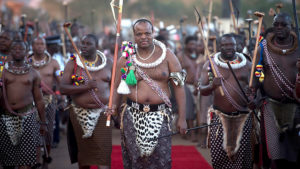King Mswati of Swaziland Declines to Choose a Bride from Tens of Thousands of Virgins Dancing Topless
This week, tens of thousands of young women from all across Swaziland gathered for the Umhlanga ceremony in which they danced in traditional native garb before their king. The dance of the reeds was performed topless before King Mswati III. In a tradition reminiscent of the Cinderella story, the King of Swaziland is entitled to choose one bride from among the young women dancing before him. But just as he did last year, King Mswati declined to take a new bride, making do with his current complement of fifteen wives.

The King was also dressed in traditional garb at the ceremony, and he, too, was topless. This year, the event was held to mark the transfer of the chairmanship of the Southern African Development Community to King Mswati from the head of Botswana, President Ian Khama. In a keynote address to many chiefs of state gathered in Lozitha, Swaziland on August 30, 2016, President Khama said: “Allow me at the outset, to pay tribute to the Government and People of the Kingdom of Swaziland, through you Your Majesty, for the tremendous hospitality, the warm welcome and for the wonderful facilities that have been put at our disposal for this Summit.” No doubt being able to witness the annual Dance of the Reeds was one of the perks.
King Mswati III is the last remaining absolute monarch on the continent of Africa. He not only reigns — he also rules. The annual Umhlanga ceremony is meant to symbolize the strength, unity and purity of the nation. Western observers are always mesmerized by the tradition. However, recently there has been some grumbling about the wastefulness of the event, considering that Swaziland is one of the poorest countries in Africa.
For libertarians, this festival should serve to remind us that in all things there is a diversity of choices available. In dress, both men and women can choose from a multitude of traditions — not merely between the burqa and more modern Western attire. Traditional clothing is not always less revealing than modern clothing — sometimes it is more so. In questions of marriage, we have more than a choice between monogamous heterosexual unions or the equivalent gay marriage between only two people.
Traditional marriage in many countries across the world involves a multitude of partners. And in terms of international accords, the best policy is not to intervene in local matters, even if they seem very strange to us. Peace can be maintained only if we understand that what happens elsewhere is really none of our business. When we are invited, we can observe, but if we want to maintain peace, we must respect local tradition, whatever it may be.




1 comment
… [Trackback]
[…] Find More to that Topic: thelibertarianrepublic.com/swaziland-tens-of-thousands-of-women-dance-topless/ […]